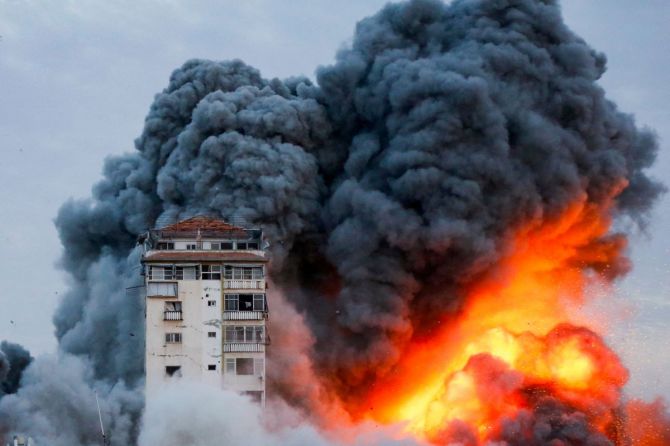''Hamas is going to be prepared. There will be booby traps and tunnels; it's going to be door to door fighting.'

Kenneth Roth was the executive director of Human Rights Watch from 1993 to 2022 when during his watch, HRW shared the Nobel Peace Prize in 1997, for banning of anti-personnel mines, helped to establish the International Criminal Court and ban children in the military.
Roth has lent his voice to human right violations in Haiti, Myanmar, the Middle East, and Bangladesh and while in office tried, but failed to establish an HRW office in India due to what he says is the 'Modi government's hostility toward human rights groups'.
After quitting HRW last year, he teaches at Princeton University, speaks at college campuses, and writes articles for the press.
Roth's father fled Adolf Hitler's Germany in 1938 just ahead of World War II. Roth was born in the United States and says his opinions on Israel, despite being Jewish, has led to vilification and being called anti-semitic.
"Hamas is pretty indifferent to the lives of Palestinian civilians. When it launched this attack into southern Israel, it knew that there would be horrible retaliation against Gazan civilians and it did it anyway. Hamas couldn't care less," Roth tells Rediff.com's Swarupa Dutt in the concluding segment of an exclusive interview.
- Part 1 of the Interview: 'Hamas is not stupid'
Is the fear of being thought of as anti-semitic compounded by Islamophobia, the reason behind this kind of the support that Israel gets from the West?
You correctly note that some defenders of the Israeli government are trying to silence criticism of Israeli conduct with charges of anti-semitism. Yes, some critics are undoubtedly anti-semitic, but the Israeli government uses that charge or its defenders use that charge, for a whole variety of very legitimate criticisms.
I am accused of being anti-semitic even though I'm Jewish, and it's just crazy.
This is an effort to silence criticism, which is dangerous. Anti-semitism is a very real problem around the world and something that confronts Jews in many places. But if people think that charges of anti-semitism are just ploys to stop criticism of Israel, and they will stop taking seriously the important problem of anti-semitism.
And so these defenders of the Israeli government may deflect the criticism of Israeli misconduct, but they are hurting Jews around the world who still face a serious problem of anti-semitism.
How is this conflict different from the previous ones in your experience?
Israel has been calling it a war, the rest of the world has been calling it a conflict. What would you call it?
It's an armed conflict. It's a war. I don't think there's any question about that. Yes, the Israeli bombardment is much more intense this time than prior conflicts, and obviously the Hamas atrocities were far, far, worse than in prior episodes. I think that's the difference.
If Israel does sends boots on the ground to Gaza, would it in your opinion, end intifadas in the future? Would this conflict be a reminder of the repercussions?
Hamas is pretty indifferent to the lives of Palestinian civilians. When it launched this attack into southern Israel, it knew that there would be horrible retaliation against Gazan civilians and it did it anyway. Hamas couldn't care less. The fact that there's going to be even more suffering if a ground invasion occurs -- I'm not sure that that would deter them in the future.
Over 5,000 people have been killed in Gaza so far. Israel lost around 1,400 people. Why bother with a ground offensive when Israel has already won the numbers game?
I'm not a proponent for ground events. I don't speak for the Israeli government. So I have no idea what their logic is. I fear that (Israeli Prime Minister Benjamin) Netanyahu is so determined to show that he's exacting vengeance that he wants to do something really big. Already, the bombing has been far more intense than ever before.
If you look at prior ground invasions, they haven't worked out terribly well. When the Israeli government invaded southern Lebanon to get rid of the PLO, they produced Hezbollah.
If they go into Gaza to supposedly get rid of Hamas they may be able to wipe out the current round of Hamas commanders. But the idea that they can get rid of militants who want to fight back against the occupation -- that's unlikely.

Netanyahu may want a ground invasion with an eye to the next elections, perhaps?
I'm not sure about that. Clearly, Netanyahu is in trouble politically. Many people are accusing him now with having been so focused on undermining the independence of the judiciary, and expanding the West Bank settlements, that he took his eye off the ball, and was neglectful about the threat coming from Hamas.
And so, he is in political trouble when there is another election. It's unclear when that will be, there's not one immediately scheduled at all. It would require his coalition to fall apart, which he has a strong incentive not to permit because he's also worried about corruption charges against him.
It's hard to say what the man's motivations are, but clearly his foremost motivations are saving himself.
Once the visits of State leaders end, the ground invasion starts, you think?
They weren't going to think about it when (US President Joe) Biden was there, you know, that was pretty obvious. I'm not sure whether Netanyahu has decided on a ground invasion because it's not going to be easy for Israel.
Hamas is going to be prepared. There will be booby traps and tunnels; it's going to be door to door fighting. A lot of Israeli soldiers will lose their lives. Netanyahu will not take this lightly.

Do you think Hamas is trying to take over the leadership of the entire Palestinian cause?
The difficulty is that the Palestinian Authority is utterly discredited. It's corrupt. It's afraid of an election; it hasn't had an election in years. No one really looks to the Palestinian Authority as providing leadership.
Hamas provides leadership that attacks civilians. So there is a problem here, where on the one hand you have a corrupt, elderly, out of touch institution in the Palestinian Authority and on the other hand, you have a brutal military dictatorship that slaughters civilians. So there is a real lack of leadership on the Palestinian side.

What does victory mean to the Palestinians? And what does it mean to Israelis?
'Israelis' is a broad concept because there's a broad political spectrum in Israel. There are many people who would like to have peace with the Palestinians, who would like to see a two-State solution, but they have not been a large enough number to elect a government. And so the Netanyahu government's vision was perpetual control of the occupied territories, without any peace process, without any Palestinian State.
Just continue to kick down the road endlessly any prospect of progress and maintain control forever while Palestinians lived under an apartheid regime. That's Netanyahu's vision.
On the Palestinian side, obviously, there are also extremes. Hamas doesn't even recognise Israel's right to exist. But I think most Palestinians would be quite happy with a genuine Palestinian state next to Israel as an alternative to their current approach.

By repeatedly comparing Hamas to ISIS what is the message Israel is sending out?
The purpose for the comparison is to try to deflect some of the nationalist motivations behind Hamas. And again, this does not justify Hamas's atrocities. You know, when you slaughter civilians, you slaughter civilians and there is no justification for whoever does it.
But ISIS was not a nationalist movement, it wanted to create an Islamic State. Hamas does want to ultimately have a Palestinian State and by comparing Hamas with ISIS, it's a way to try to erase some of the nationalist motivation that among many Palestinians, is the dominant concern.
What is the post-war future for Israel, Palestine?
At this point, the two-State solution is moribund. It's because the endless Israeli expansion of settlements in the West Bank has made it virtually impossible for a contiguous Palestinian State to merge. And that's why people talk about the one-State reality.
But we're a long way from having the trust needed to build a one-State reality on equal rights.
I think for the immediate future, it's going to be more apartheid.

You are the son of a Jewish refugee who fled Germany, is that correct? Your opinions, your comments, whatever you've been writing on Israel, run contrary to what many Jews across the world believe. Have you been vilified for it?
My father fled Germany in July 1938 as a 12-year-old boy. He had grown up in Frankfurt.
Actually, I don't think my views are that different from many Jews. I mean, if you look in the United States where I'm most familiar with American Jewish public opinion, the majority of American Jews are not happy with the Netanyahu government.
I certainly have received my share of vilification. Anyone does who criticises the Israeli government's human rights violations.
But my views have become fairly mainstream, particularly among American Jews. Most American Jews are very unhappy with the direction of the Israeli government, especially under Netanyahu's far-right coalition of extremists.
It has become so bad that Netanyahu has largely given up on looking to American Jews for political support other than the most conservative segment such as the Israel-can-do-no-wrong group AIPAC (American Israel Public Affairs Committee) (external links).
Instead, he relies on Christian evangelicals, who support Israel for Biblical reasons, seeing it as a prelude to the second coming of Christ.

HRW shared the Nobel Peace Prize in 1997 while you were heading it. What is your legacy to HRW? You resigned from HRW last year.
Apart from Princeton University where else do you teach, lend, your immense expertise? What else are you involved with? When is your book going to be out?
My main legacy at HRW was building a global organisation, which now works regularly in some 100 countries worldwide and has advocacy and communications offices in many countries. We had planned to set one up in India, but sadly, the Modi government's hostility toward human rights groups made that impossible.
HRW is now able to report on human rights violations wherever they occur and generate pressure from a range of allies around the world to try to make those violations stop.
At Princeton, I am teaching two courses at the School of Public and International Affairs, one on global strategies for defending rights, the other on international criminal justice. I have also been speaking widely on college campuses, appearing regularly in the media, and writing articles for the press.
My book, Righting Wrongs, will be published by Knopf. The manuscript is almost done, but given the slow pace of the publishing world, it won't be out for another year.

India has supported Israel in this conflict and historically, India is perhaps one of the few countries where Jews have never been persecuted.
But what do you think of human rights under the current dispensation in India which has come down heavily on minorities, especially Muslims and Christians.
India is 112th amongst 165 countries on the Human Freedom Index 2022.
I have been deeply troubled by the direction of the Indian government under Prime Minister Modi and his BJP. Religious minorities, particularly Muslims, have been openly persecuted, often with the encouragement of BJP leaders, and rarely with effective government efforts to stop it.
Modi seems to see his Hindu nationalism as a vote-getter, but it is a sad step backwards from India's pluralistic origins of tolerance for religious differences.
Modi has also shown himself to be remarkably thin-skinned, regularly trying to censor or discourage critics. He has also substantially closed the space for civic groups that are critical of his government, especially environmental and human rights groups. That is not how the world's largest democracy should behave.
Feature Presentation: Aslam Hunani/Rediff.com










